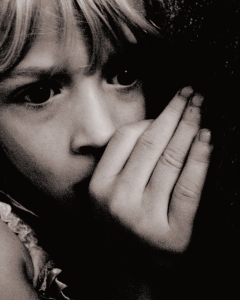Emotional Bullying: Using Guilt to Lead Kids to God
 I was talking to a friend who, although raised in the church, is pretty antagonistic toward Christianity. He was talking about his childhood and how Sunday school and VBS constantly beat into his head his personal responsibility for Christ’s death.
I was talking to a friend who, although raised in the church, is pretty antagonistic toward Christianity. He was talking about his childhood and how Sunday school and VBS constantly beat into his head his personal responsibility for Christ’s death.
Not in the “Christ died for your sins” vein, but more like, “It was your sins that drove the spikes into Jesus’ hands and feet.” The way his parents and church hammered (no pun intended) into him his personal responsiblity, made him feel mortifying shame.
It worked, he was a devout little kid. But he wasn’t propelled out of a sense of gratitude or wonder. No—his driving motivation for being good was humiliation.
As he got older, he walked away from the whole thing. I know so many people who have had the same experience. When they get older, their guilt turns into anger and frustration.
I ‘d seen the same things laid on kids in churches I’ve attended, and it breaks my heart. To a little kid, there’s a huge difference between “Christ died for our sins” and “your sins made Christ die.” It may be subtle, but it’s there.
Have others experienced this?
So I asked on Twitter if others had this same experience growing up:
How many of you were told about your personal responsibility for Christ’s death as a child? #curious
— Jayson Bradley (@jaysondbradley) July 25, 2014
Here’s some of the responses:
@jaysondbradley raised Catholic and went to Catholic schools from K to 12. My whole life was a guilt trip! — Kelly McDermott (@Blueirisheyez) July 25, 2014
@jaysondbradley yep. And every time I sinned I put him back on the cross in that moment.
— James Forde (@TheJamesForde) July 25, 2014
@TheJamesForde @jaysondbradley
This. Right here. Me.
— Danielle Larson (@DanielleELarson) July 25, 2014
@jaysondbradley I was. Was also told that I may be responsible for others’ damnation if I didn’t share the Gospel with them — Byron Lipper (@byronlipper) July 25, 2014
This last one really resonated with me. I can’t count the times I was told that people were going to look at me during judgment and mouth the words, “Why didn’t you tell me!?” as they were led to their eternal torment. Great, I have to spend eternity with that on my conscience?
Guilt’s not a great motivational tool
I get why it’s so easy to use guilt—especially on children. They’re so tender and making them feel guilty tends to make them respond immediately. But in the end, it may do your cause more harm than good.
It’s similar to the way parents use overpowering fear and intimidation to get immediate obedience out of a child even though they’re creating relational difficulties that will come to fruition later.
When children get older and are capable of deeper reflection, they start to resent the guilt that was used to motivate them. They start being distrustful and leery of emotional controlled.
We need to be mindful of how we communicate these profound truths to children (and, let’s be honest, adults too). The emotional implications for some of the extremely dramatic language, imagery, and metaphors we use can be damaging.
Jesus simply said, “Let the little children come unto me.” Not, “Compel them to come unto me by making sure they understand what bad little children they are.”
I’d love to hear your story. Did your parents/church introduce you to Christ in an organic, healthy way? Did you spend a lot of your childhood feeling guilty? Do you agree or disagree that guilt is not the best tool for religious instruction?
![]()

